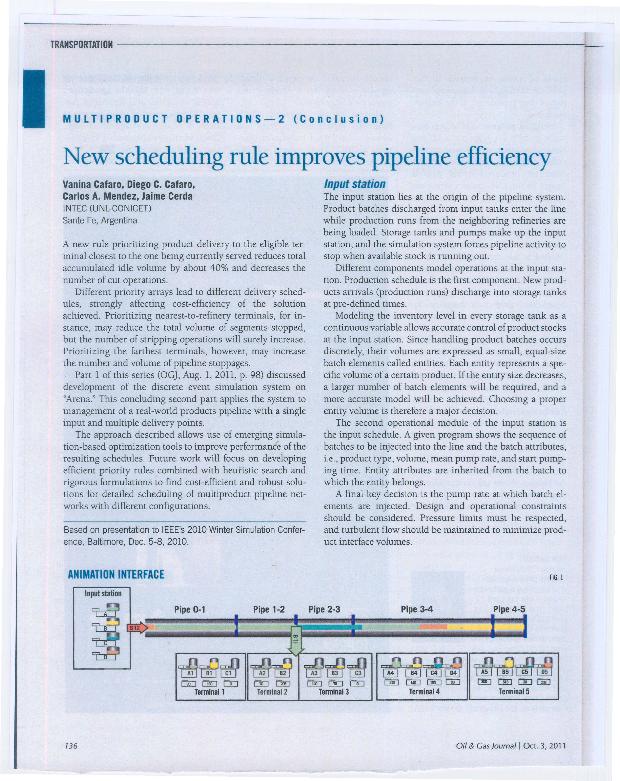Mostrar el registro sencillo del ítem
dc.contributor.author
Cafaro, Vanina

dc.contributor.author
Cafaro, Diego Carlos

dc.contributor.author
Mendez, Carlos Alberto

dc.contributor.author
Cerda, Jaime

dc.date.available
2017-02-13T20:43:39Z
dc.date.issued
2011-10
dc.identifier.citation
Cafaro, Vanina; Cafaro, Diego Carlos; Mendez, Carlos Alberto; Cerda, Jaime; New scheduling rule improves pipeline efficiency; Pennwell Publ Co Energy Group; Oil & Gas Journal; 109; 17; 10-2011; 136-139
dc.identifier.issn
0030-1388
dc.identifier.uri
http://hdl.handle.net/11336/12928
dc.description.abstract
A new rule prioritizing product delivery to the eligible terminal closest to the one being currently served reduces total accumulated idle volume by about 40% and decreases the number of cut operations. Different priority arrays lead to different delivery schedules, strongly affecting cost-efficiency of the solution achieved. Prioritizing nearest-to-refinery terminals, for instance, may reduce the total volume of segments stopped, but the number of stripping operations will surely increase. Prioritizing the farthest terminals, however, may increase the number and volume of pipeline stoppages. Part 1 of this series (OGJ, Aug. 1, 2011, p. 98) discussed development of the discrete event simulation system on “Arena.” This concluding second part applies the system tomanagement of a real-world products pipeline with a single input and multiple delivery points. The approach described allows use of emerging simulation- based optimization tools to improve performance of the resulting schedules. Future work will focus on developing efficient priority rules combined with heuristic search and rigorous formulations to find cost-efficient and robust solutions for detailed scheduling of multiproduct pipeline networks with different configurations.
dc.format
application/pdf
dc.language.iso
eng
dc.publisher
Pennwell Publ Co Energy Group

dc.rights
info:eu-repo/semantics/openAccess
dc.rights.uri
https://creativecommons.org/licenses/by-nc-sa/2.5/ar/
dc.subject
Discrete-Event Simulation
dc.subject
Oil-Product Pipelines
dc.subject
Optimization Tools
dc.subject.classification
Ingeniería de Procesos Químicos

dc.subject.classification
Ingeniería Química

dc.subject.classification
INGENIERÍAS Y TECNOLOGÍAS

dc.title
New scheduling rule improves pipeline efficiency
dc.type
info:eu-repo/semantics/article
dc.type
info:ar-repo/semantics/artículo
dc.type
info:eu-repo/semantics/publishedVersion
dc.date.updated
2017-02-09T13:52:07Z
dc.journal.volume
109
dc.journal.number
17
dc.journal.pagination
136-139
dc.journal.pais
Estados Unidos

dc.journal.ciudad
Tulsa
dc.description.fil
Fil: Cafaro, Vanina. Consejo Nacional de Investigaciones Científicas y Técnicas. Centro Científico Tecnológico Santa Fe. Instituto de Desarrollo Tecnológico Para la Industria Química (i); Argentina. Universidad Nacional del Litoral; Argentina
dc.description.fil
Fil: Cafaro, Diego Carlos. Consejo Nacional de Investigaciones Científicas y Técnicas. Centro Científico Tecnológico Santa Fe. Instituto de Desarrollo Tecnológico Para la Industria Química (i); Argentina. Universidad Nacional del Litoral; Argentina
dc.description.fil
Fil: Mendez, Carlos Alberto. Consejo Nacional de Investigaciones Científicas y Técnicas. Centro Científico Tecnológico Santa Fe. Instituto de Desarrollo Tecnológico Para la Industria Química (i); Argentina. Universidad Nacional del Litoral; Argentina
dc.description.fil
Fil: Cerda, Jaime. Consejo Nacional de Investigaciones Científicas y Técnicas. Centro Científico Tecnológico Santa Fe. Instituto de Desarrollo Tecnológico Para la Industria Química (i); Argentina. Universidad Nacional del Litoral; Argentina
dc.journal.title
Oil & Gas Journal

dc.relation.alternativeid
info:eu-repo/semantics/altIdentifier/url/http://www.ogj.com/articles/print/volume-109/issue-40/transportation/multiproduct-operations-2-conclusion-new.html
Archivos asociados
